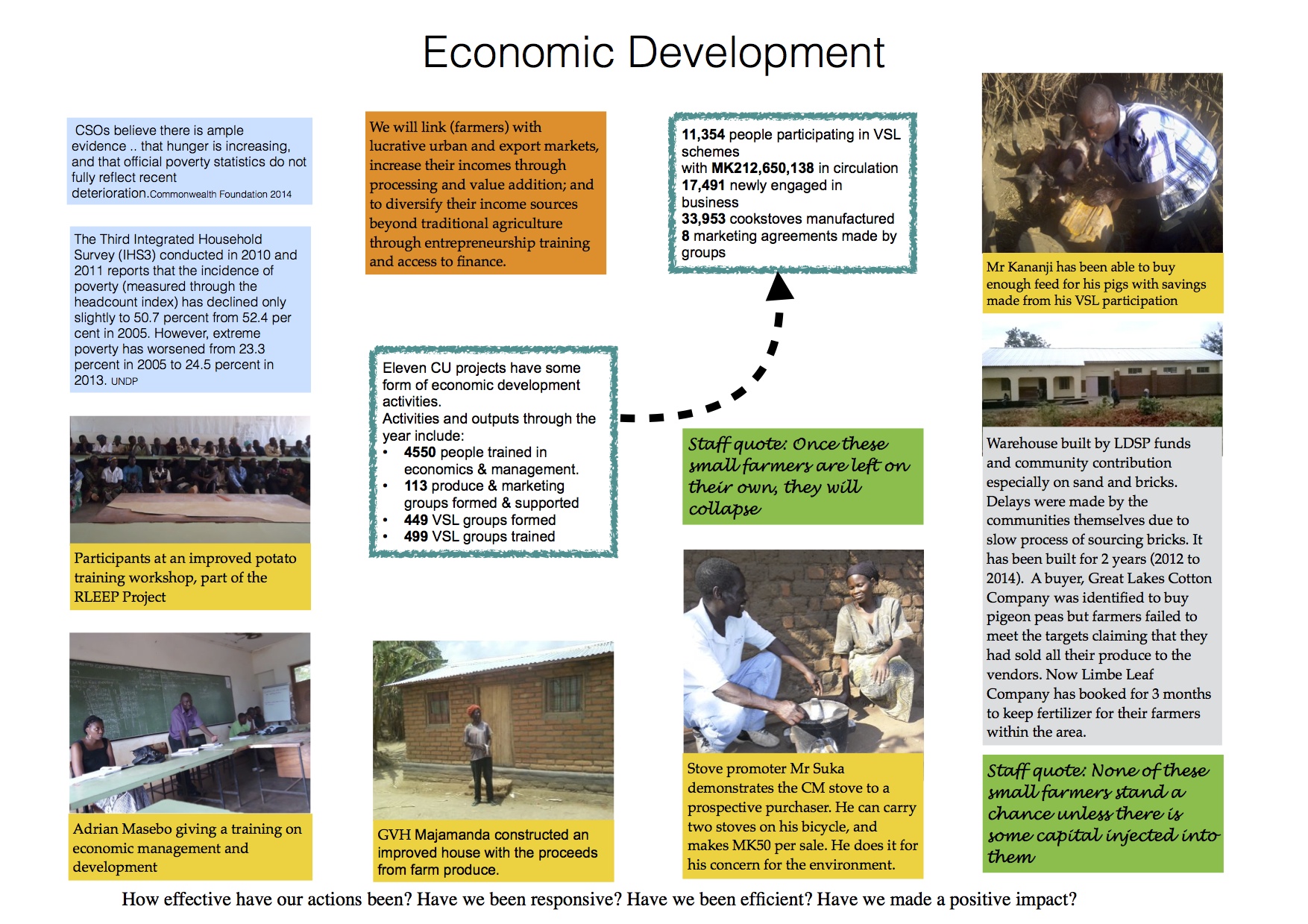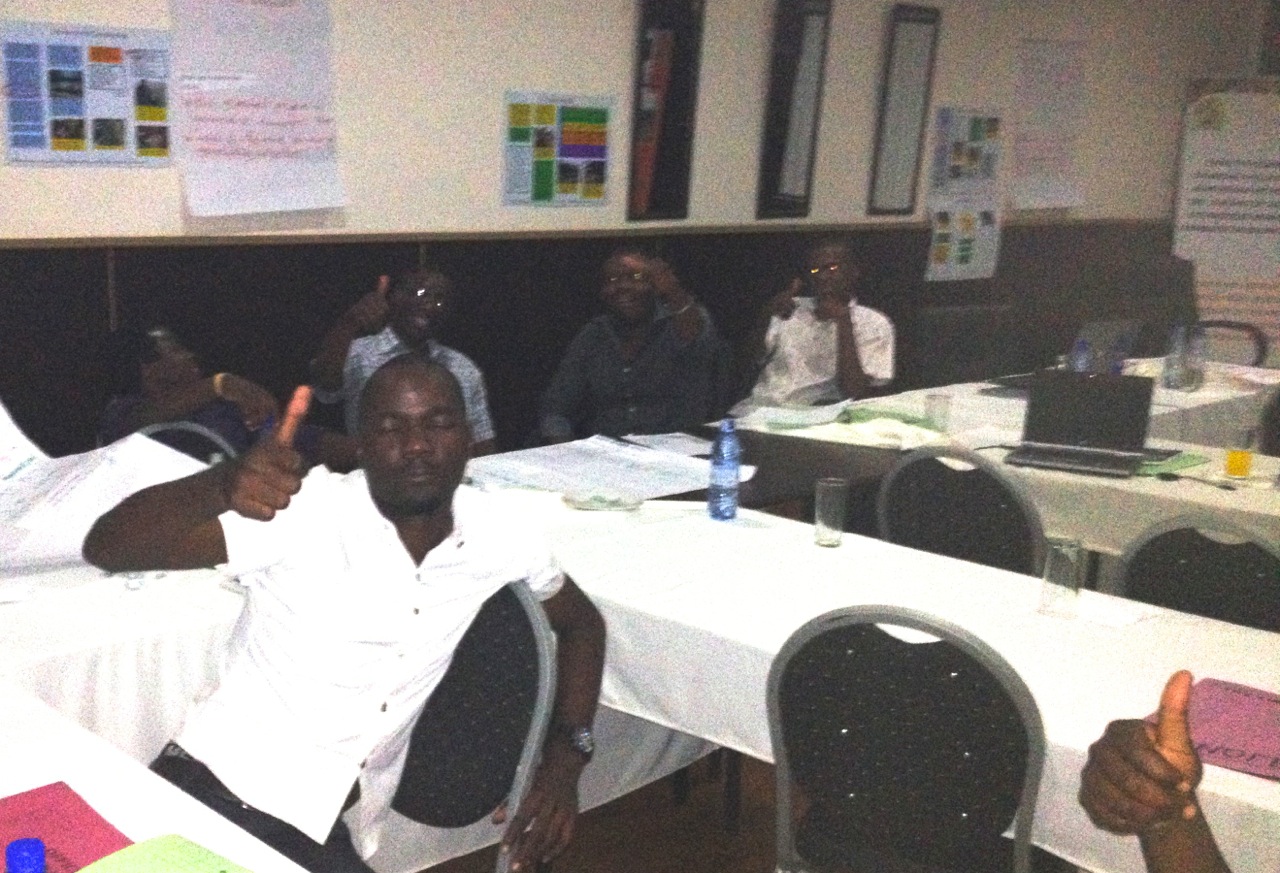All aid agencies want to demonstrate that they’ve made an impact. My current big job is to write the 2013 -14 Concern Universal Malawi Impact Report, which has been (and continuous to be) an interesting exercise. The problem is……..multitudinous.
Concern Universal Malawi is a complex organisation – a few points to illustrate:
- CU Malawi’s goal is (as is normal today) an outcome viz: ‘to have made a lasting improvement in peoples lives’.
- It currently implements approximately 23 diverse projects at various stages of completion.
- It has eleven operating centres (offices) and works in nine Regions across Malawi
- Funding for projects and programs comes from approx. 21 different donors. Each donor has it’s own agenda and reporting requirements.
- There is a combination of different projects and sub-projects, sometimes with different donors.
- There is encouragement to work with ‘partners’. With no definition of what a partnership is, there are multiple working relationships with other bodies.
With each project having it’s own goals, M&E and reporting system I have approached the problem using grounded theory, looking at the data available and seeing what emerges. I now have information and stories across nine different themes from all projects.
- Advocacy and Social Inclusion
- Agricultural Production
- Economic Development
- Environmental Sustainability
- Farm and other inputs
- Health and Nutrition
- WASH (Water, Sanitation & Hygiene)
- Working with Others
In addition, ’Impact Reports’ are necessarily subjective (as they report on the broader system, which is by definition value laden), and dependant on not just the authors but also the intended recipients. The main intended audience of such a report are the donors, but with a desire that it should be ‘rigorous’ and ‘not just a PR exercise’. I am thus also running it as a development exercise for staff, which I hope will allow them to better understand the organisation they work in, and also provide the opportunity for them to say what they want to say with regard to ‘impact’.
Using posters developed for each theme (and the ‘poster process’) I have now taken it to one team (Sugar Producers Capacity Building) for their reflections and input. Along with others, their input will then contribute to the ‘learnings’ for a document later tailored for the donors. Maybe… one day… we could get staff and donors in the same room…….

Staff comments on Environmental Sustainability activities impact: Reduction in tree cutting because of promoting solar lamps and CM stoves

Staff comments on ‘Pro-poor’ Economic Development activities – Fairly good impact on linking farmers to lucrative markets as witnessed by the involvement and contribution of Fairtrade: Excellent impact on Village Savings & Loans (the numbers speak for themselves and they are screaming): More projects featuring economic development activities. Great pickup on stoves by communities

Thumbs up by the Sugar Project staff for the poster process (carried out after they’d had a long day in Fair Trade training). Note 3 of 13 posters on wall behind.

Hi Martin. Thanks for your posts – I really get a lot out of them and love hearing how you tackle seemingly tricky issues and yet find a way through. I’m impressed with how everyone pulls together – often despite the best-laid plans. I’m interested in ‘grounded theory’ – got any references to start me off? I’ve just taken on a “Coordinator” role for Environment and Natural Resources in the Regional Services Group of DEPI (must seem a dim distant memory to where you are now?!) and am interested in how this approach would work here too. M&E is a key to telling the change story. Thanks again, Karen.
Hi Karen, Thanks for your input and query.
The start of the Wikipedia entry for grounded theory is relatively simple:
Grounded Theory Method (GT) is a systematic methodology in the social sciences involving the discovery of theory through the analysis of data.[1][2] Grounded theory method is a research method which operates almost in a reverse fashion from traditional social science research. Rather than beginning with a hypothesis, the first step is data collection, through a variety of methods.
but then it starts making it far more complicated than a mere mortal like me can properly understand. Thus another, slightly easier description is by Bob Dick at:
which is probably necessary if you are wanting or needing to use it in a traditional academic context. However, I still find it as a description for everyday use a bit complicated.
A ‘hallelujah’ moment for me was when I realised that what these guys talked about as ‘grounded theory’ was in practice being explained in books such as:
or even simpler, described as ‘card storming’ in
However, whilst these descriptions of a technique are easy and simple, I think it is necessary to remember that there has to be an element of rigour in how you use it. I have seen people use ‘card storming’ in a workshop and manipulate the process so that it could not in any way be described as either rigourous, or authentic, or even in the end useful.
I hope this helps,
Regards,
Martin